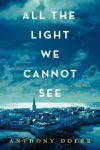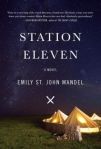The National Book Award longlists have been announced for fiction, nonfiction, poetry and young people’s literature. As is usual for these types of lists, announcing books in the running for the awards, they provide great reading suggestions. Below is a quick look at the fiction nominees. You’ll find short stories, dystopia, World War II, the life of an Iowa farm family and more. To get all the longlists, visit the National Book Foundation.
The finalists (shortlists) will be announced exclusively on NPR’s Morning Edition on October 15. The winners will be announced November 19 in New York City.
 An Unnecessary Woman by Rabih Alameddine
An Unnecessary Woman by Rabih Alameddine
This is a portrait of a woman’s life in the Middle East (Beirut), focusing on the fictional 72-year-old translator Aaliya Sohbi who lives alone with her books. The publisher describes the story as a reclusive woman’s late-life crisis. Publisher’s Weekly in a starred review says: “Alameddine’s most glorious passages are those that simply relate Aalyia’s thoughts, which read like tiny, wonderful essays.”
 The UnAmericans: Stories by Molly Antopol
The UnAmericans: Stories by Molly Antopol
A debut story collection with plot lines focusing on critical moments in the 20th century. Kirkus Reviews says Antopol is a writer to watch. I love this comment by Meg Wolitzer on NPR about the stories: “They’ll make you nostalgic, not just for earlier times, but for another era in short fiction. A time when writers such as Bernard Malamud, and Issac Bashevis Singer and Grace Paley roamed the earth.”
 Thunderstruck and Other Stories by Elizabeth McCracken
Thunderstruck and Other Stories by Elizabeth McCracken
Another story collection, this one by the author known for her debut novel The Giant’s House that was a 1996 National Book Award finalist. The New York Times review says, “…her wisdom and wit have a moral dimension that deepens our sympathy for her straying souls, encouraging us to picture ourselves in even their most improbable predicaments.” Publisher’s Weekly gives it a starred review, as does Kirkus Reviews.
 Redeployment by Phil Klay
Redeployment by Phil Klay
Yet another story collection among the contenders, this one’s a piercing look at U.S. Marines involved in the Iraq and Afghanistan conflicts. Klay digs deeply, honestly and convincingly into the inner lives of his men and enlightens our understanding of the Marine combat experience. Via “The morally bruising battlefield” written here on TLC: “It’s impressive, enduring fictional truth.”
 Orfeo by Richard Powers
Orfeo by Richard Powers
In this novel, composer protagonist 70-year-old Peter Els ends up on the lam when Homeland Security discovers his home-based biochemical engineering lab, where Peter pursues an innocent hobby. It’s called “engrossing” by The Washington Post and considered an emotional engager by the reviewer in The New York Times. Powers won the National Book Award in 2006 for The Echomaker.
 All the Light We Cannot See by Anthony Doerr
All the Light We Cannot See by Anthony Doerr
Ohio author Anthony Doerr’s newest novel has held a sustaining place on The New York Times best-seller list this year. It’s a World War II story about the converging lives of a German soldier and a blind French girl in occupied France 1944. The book industry’s forecasting magazines — Kirkus Reviews, Publisher’s Weekly and Library Journal – all give Doerr’s book starred reviews.
 Lila by Marilyn Robinson
Lila by Marilyn Robinson
This is Robinson’s third novel set in the fictional town of Gilead, Iowa. It focuses on Reverend Ames’ young bride, Lila, whom Robinson introduced in her Pulitzer Prize-winning Gilead. The publisher describes the new book as “an unforgettable story of a girlhood lived on the fringes of society in fear, awe and wonder.” Michiko Kakutani in The New York Times calls it “flawed but poignant.”
 Some Luck by Jane Smiley
Some Luck by Jane Smiley
This is the first book in a trilogy about the Langdon Iowa farm family, Walter and Rosanna and their five children. Spanning 1920 through the early 1950s, each chapter covers a single year. Publisher’s Weekly gives it a starred review as does Kirkus Reviews, which says it’s: “An expansive, episodic tale showing this generally flinty author in a mellow mood: surprising, but engaging.”
 Wolf in White Van by John Darnielle
Wolf in White Van by John Darnielle
The story is about a 17-year-old-boy with a grossly disfigured face and the role-playing game he invents about a post-apocalyptic America. A recent New York Times review describes the book as a “strange and involving novel…about alienation and despair and the search for meaning.” The book’s publisher says it “unfolds in reverse until we arrive at both the beginning and the climax.”
 Station Eleven by Emily St. John Mandel
Station Eleven by Emily St. John Mandel
A dystopian novel about a pandemic that wipes out society as we know it. After the catastrophe, a traveling group of actors and musicians performs Shakespeare in towns around the Great Lakes Region. I’m one-third of the way through the book and find it gripping. Early chapters about the uncontrollable virus overcrowding hospitals and taking lives is chilling. Starred review from Kirkus Reviews but not from Publisher’s Weekly.
The mission of the National Book Foundation and the National Book Awards, as stated on the Foundation website, is to celebrate the best of American literature, to expand its audience and to enhance the cultural value of great writing in America.
